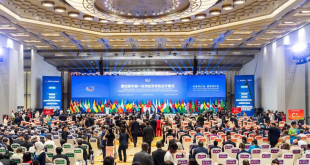By DAVID MONYAE/SIZO NKALA

MA XUEJING/CHINA DAILY
The Communist Party of China celebrates the 100th anniversary of its founding in July. From the humble beginnings of its first national congress in Shanghai, the CPC now stands tall.
After 72 years in power, it presides over the world’s second-largest economy. China’s GDP is estimated to be $14.7 trillion in 2020, second only to that of the United States which is estimated to be $20.9 trillion. Consistent economic growth has enabled it to carry out the most successful poverty-alleviation drive in the history of the world. The country’s extreme poverty rate declined dramatically from 66.3 percent in 1990 to just 0.3 percent in 2018, and Xi Jinping, general secretary of the CPC Central Committee, announced in February the country had completely eliminated abject poverty.
An equally stunning achievement is how the CPC has managed to build a State strong enough to govern 1.4 billion people peacefully for 72 years. It has arguably overseen perhaps the longest period of general peace and stability in Chinese history. And China is now leveraging its huge economy and political stability to have a greater say in global affairs, speaking up on behalf of all developing countries. It is playing an increasingly visible role in the international arena in areas such as peacekeeping, public health, trade and technology. Such initiatives as the Asian Infrastructure Investment Bank and the Belt and Road Initiative signal China’s desire to play a bigger role in global affairs. China is also mounting a formidable challenge to the West’s hegemony in economics and governance. This has created tensions with the West which have culminated into the ongoing tensions with the US.
The CPC’s achievements and the rise of China have had far-reaching implications for Africa. The CPC has been actively cultivating cordial relations with African countries since the 1955 Bandung Conference in Indonesia which sought to deepen cooperation between developing countries. The Party provided material and ideological support to Africa’s liberation and decolonization movements. In return, African countries supported China gaining its rightful seat in the United Nations in 1971 and have steadfastly rallied behind the one-China policy.
As the relations between China and Africa grew in the late 1990s, the two sides agreed to establish the Forum for China-Africa Cooperation, which has provided an effective platform for the expansion and facilitation of development cooperation between China and Africa based on mutual benefit since it was first held in 2000. Over the last two decades, China has become Africa’s largest trading partner, with trade between the two sides reaching $208 billion in 2019. China is also Africa’s largest bilateral creditor which has helped ease the continent’s financial shortfall.
Moreover, China is almost omnipresent in Africa’s infrastructure development drive, helping the continent’s transport, communication, water and sanitation and energy sectors. Having invested $25 billion in Africa’s infrastructure projects in 2018, China became the single largest bilateral investor in the continent’s infrastructure. Without China’s economic partnership and support, it would have been difficult for Africa to enjoy the rapid economic growth it has witnessed since the mid-90s. China has also supported Africa’s efforts to contain the novel coronavirus, which has claimed the lives of almost 3 million around the world. Hence, the rise of the CPC and China has been of immense benefit to Africa and its people.
But China is more than just a diplomatic ally of African countries or assistor of the economic development. It is also a potential role model. African countries, a good number of which are still run by liberation movements, have a lot to learn from China and the CPC. The CPC has presided over and maintained astonishing economic growth levels for the country while building strong State institutions that have ensured effective governance and stability. These are two things that have been elusive in most African countries. Just 30 years ago, the level of development in China was equal to if not worse than that in Africa. Nonetheless, it has transformed itself and emerged as a global economic powerhouse while Africa remains the least developed continent in the world.
One of the most important lessons African countries can learn from China and the CPC is the centrality of historical contingency in the success of economic and social policies. In its development process, while it learned from foreign models and experiences, China did not just transplant these ideas. Instead, its economic policies were largely informed by and tailored to meet the country’s historical, cultural, geographical and political conditions.
Second, China has also shown that pragmatism and not dogmatism should govern the choice of policies. As Africa struggles to eradicate poverty, it can also learn from the CPC’s poverty reduction strategies which have helped eliminate extreme poverty in China. Moreover, China’s political model is something Africa can learn from: democracy at the grassroot level ensures that people have a say in the decisions that affect their lives; meritocracy at the higher level ensures that China is governed by competent individuals with a firm grasp of economics, international relations and science and technology, so as to be able to make the correct decisions for the country. Most importantly, it also ensures continuity in politics which is good for policy consistency. Partly as a result of meritocratic recruitment, China has been able to deal with the problem of corruption, a vice which continues to afflict Africa to devastating effect. According to the 2020 Transparency International Index, China moved from No. 100 in 2014 to No. 78 in 2020 out of 180 countries in the corruption prevalence rankings. The rise of China under the CPC can serve as a model and guide for Africa as it charts its own development path.
It remains to be seen what the next century holds for the CPC and the world. While it started its first century as an obscure, sparse and loosely coordinated communist movement in the early 20th century China, it begins its next one as a global trailblazer ruling a potential superpower-in-waiting. The Party has already evolved in striking ways to adapt to the changing environment in China and the world. The CPC’s domestic outlook will be shaped by China’s rising middle-income group. In the external environment, the CPC will seek to ensure the Western countries, China’s neighbors and the Global South perceive its increasingly prominent role on the global stage in the correct way.
David Monyae is director for the Centre for Africa-China Studies at the University of Johannesburg. Sizo Nkala is a postdoctoral research fellow at the same institute. The authors contributed this article to China Watch, a think tank powered by China Daily.
China Daily Global
 Africa -China Review Africa -China Cooperation and Transformation
Africa -China Review Africa -China Cooperation and Transformation
